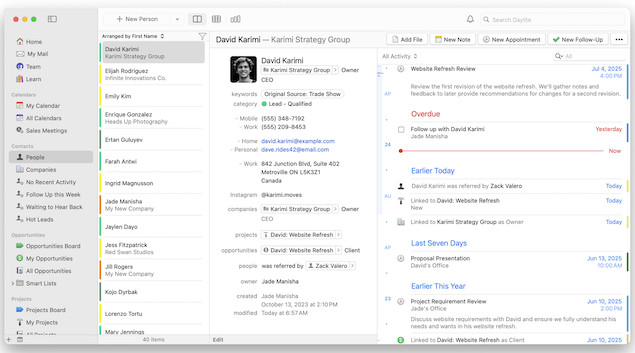When it comes to Customer Relationship Management (CRM) software, not every tool is optimized for macOS.
If you’re looking for effective CRM tools that work well with Macs, I’ve looked at the very best Mac compatible CRM software of 2025.
Surprisingly, Apple has never made a native CRM for either macOS or iOS so the only options are from third parties.
Of course, you could build your own using a Mac compatible database software but that takes time and there’s plenty of excellent ready made CRMs out there.
I’ve tested and reviewed a range of the best Customer Relationship Management services from personal CRMs for freelancers to small business CRMs to manage everything from contacts to sales pipelines.
Contents
- How To Choose a CRM For Macs
- Cloud-Based vs. a Native Mac CRM
- Mac CRM Comparison Table
- 1. Daylite (Best Native Mac CRM)
- 2. Klaviyo (Best For B2B & Email Marketing)
- 3. Pipedrive (Best CRM For Sales)
- 4. Clay (Best Personal CRM)
- 5. Bigin By Zoho (Best CRM For Small Sales Teams)
- 6. Thryv (Best CRM For Sales Management)
- 7. Close (Best CRM For VoIP Integration)
- 8. Contacts Journal CRM (Best One Time Purchase CRM)
- 9. Salesforce (Best CRM For Enterprises)
- 10. Folk CRM (Best Simple macOS/iOS CRM)
- 11. Clarify (Best AI CRM)
- Why Trust Our Reviews
- Related Software
- How We Chose These Mac Compatible CRMs
- Why Use a CRM On a Mac?
- What’s New in 2025 For CRM Software?
How To Choose a CRM For Macs
The first step is to match the CRM with how you already use your Mac:
- Do you live inside Apple Mail, Calendar, and Contacts? Some CRMs integrate directly with these apps (like Daylite, which is Mac-native). Others require Gmail or Outlook instead.
- Are you mostly on Safari, or do you switch between browsers? Some CRMs offer Safari extensions to log emails and capture leads.
- Do you use iPhone and iPad alongside your Mac? If so, pick a CRM with strong iOS apps so you can stay updated on the go.
By thinking about your daily Mac setup first, you’ll avoid buying a CRM that forces you to change the way you work.
Cloud-Based vs. a Native Mac CRM
Most modern CRMs are cloud-based, which means you run them in a browser (Safari, Chrome, Firefox) and all your data is synced automatically. The upside is flexibility – you can log in from any Mac. The downside is you’re at the mercy of your internet connection and of course, all of your data is stored online.
There are very few native Mac CRMs, – Daylite is one of the few exceptions as its designed specifically for macOS and offers excellent integration with Apple Mail and Calendar. There are also a few others such as Bigin, Clay and Contacts Journal CRM that also offer Mac desktop apps.
Mac CRM Comparison Table
To help get an overview of the best Mac compatible CRMs I found, here’s a side-by-side comparison of each one with some essential facts before we dive into the reviews.
| CRM | Best For | Pricing Starts At | Free Plan? |
|---|---|---|---|
| Daylite | Mac / Apple device users, small service businesses needing integrated CRM + project/task management | US $19/month for one user | No free plan, but offers a 14-day free trial |
| Klaviyo | B2B customer relationship management and businesses that need customizable email marketing tools | Starts at US $20/month | Free tier available for up to 250 contacts and 500 monthly email sends. |
| Pipedrive | Sales teams needing pipeline-centric CRM with good UI and integrations | $14.00 / user / month (lowest “Essential” tier in many markets) | No fully free plan (trial only) |
| Clay | Personal relationship / “contact-centric” CRM | Free plan (up to 1,000 contacts) + paid plans (e.g. Pro $10 / user / month) | Yes, free plan exists (for personal use) |
| Bigin by Zoho | Micro / small sales businesses needing a lightweight CRM | US $7 / user / month (Express plan) | Yes (free plan) |
| Thryv | Service-based small businesses wanting CRM + communications + local marketing tools | From $646 / month for their “Kickstart” bundle (location-based pricing) | Not really — no true free plan listed (demo / consultation offered) |
| Close | Sales / inside sales teams needing built-in calling / email / automation | US $9 / user / month for Solo plan (1 user) | No permanent free plan, but free trial available |
| Contacts Journal CRM | Individual / small teams wanting contact-centric task + history management | $79.99 one time purchase for full access | No but free trial available |
| Salesforce | Enterprises and scaling organizations needing highly customizable platform | US $25 / user / month (“Starter Suite”) | No free plan (though free trials and developer edition available) |
| Folk CRM | Teams / small businesses needing modern contact & workflow CRM | US $20 / member / month (“Standard”) | No but free trial available |
| Clarify | Those that want extensive AI assistance with CRM tasks | Starter Plan $20/month | Free plan available for up to 2.5k credits/month. |
1. Daylite (Best Native Mac CRM)
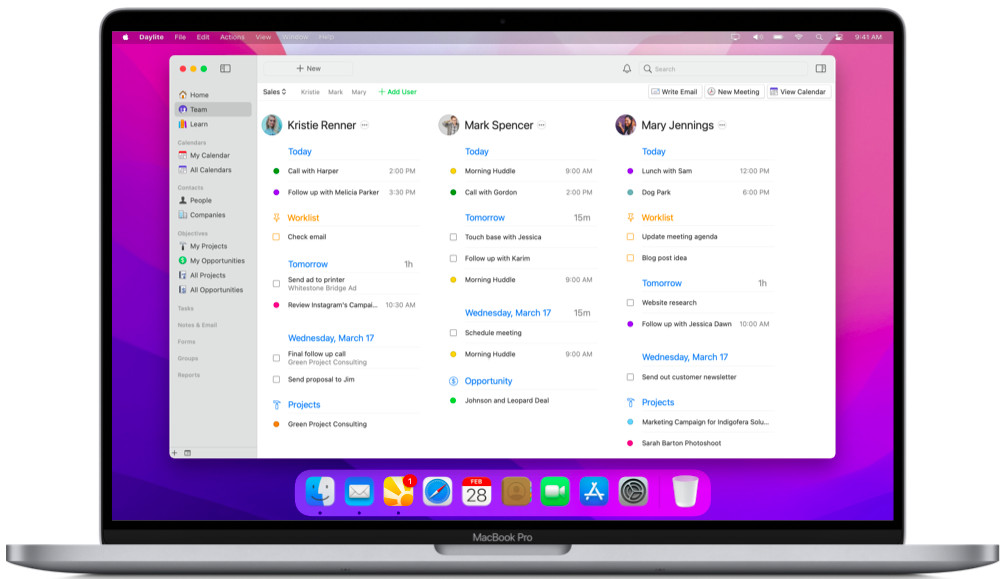
Best For: Mac and iOS users who want a native combined CRM and project management solution
Why I Chose It:
Daylite might not be as powerful as the rest but it stands out as the only CRM designed specifically for macOS and iOS. If you’re tired of juggling spreadsheets and multiple apps to manage your clients, calendar, and tasks, Daylite pulls it all together in the cleanest, macOS-friendly app I’ve tried. It’s not just a CRM, it also doubles as a powerful project management tool, making it especially valuable for small teams or solo entrepreneurs who want an all-in-one system.
Features:
- Integration with Apple Mail, Contacts, Siri, and Calendar
- Built-in tools for contact and sales pipeline management
- Project and task tracking for individuals or teams
- Offline desktop functionality with syncing to Daylite Cloud
- Quote and estimate generation
- Optional third-party add-ons for invoicing and accounting (e.g. Billings Pro, MoneyWorks)
Integrations:
- Native support for Apple Mail, Calendar, Contacts, and Siri
- Sync with iOS apps for mobile use
- Integrates with Zapier, Slack, Zoom, and more via plugins
Pricing:
- Leap Plan Starts at $19.00/month. Growth Plan $39.00 and Scale Plan $59.00. Custom Plans available on request Includes full access to Daylite Cloud syncing.
- Free 30-day free trial available.
You can read our full Daylite CRM review for more.
✅ Pros:
- Designed specifically for Mac and iOS
- Excellent project management and task tracking
- Works offline on desktop
- Integrates smoothly with native Apple apps
- No contracts or long-term commitments
❌ Cons:
- No built-in financial planning or forecasting tools
- Lacks real-time reporting features
- No built-in email marketing automation
- No free version available
2. Klaviyo (Best For B2B & Email Marketing)

Best For: Mac users and e-commerce businesses who want a CRM that’s built around customer data, email marketing, and automation rather than sales pipelines
Why I Chose It:
If your business revolves around online sales or email campaigns, Klaviyo is one of the best CRM/marketing platforms out there, especially for B2C relationships. Unlike traditional CRMs such as Salesforce or HubSpot, Klaviyo focuses on customer engagement and retention rather than lead management. It’s particularly powerful for syncing with Shopify and WooCommerce, automatically creating detailed customer profiles based on purchase history, site activity, and email communications. Klaviyo works perfectly in any browser on macOS, and integrates with Apple Mail and productivity apps via Zapier and other automation platforms.
Features:
- Unified customer profiles with purchase, browsing, and engagement data
- Advanced segmentation for personalized email and SMS campaigns
- Pre-built automations for abandoned carts and post-purchase follow-ups
- A/B testing and performance analytics for every campaign
- Predictive analytics for customer lifetime value and churn risk
- Forms and pop-ups for lead capture
- Integration with e-commerce platforms, payment tools, and ad networks
Integrations:
Klaviyo integrates with major tools like:
- Shopify, WooCommerce, BigCommerce, Magento
- Stripe, PayPal, ReCharge
- Meta (Facebook), Google Ads, TikTok Ads
- Zapier, Airtable, Notion
- Apple Mail and Calendar via third-party sync tools
- Squarespace, Wix, WordPress
Pricing:
- Free tier available for up to 250 contacts and 500 monthly email sends.
- Paid plans start at around $20/month, scaling based on contact count and SMS usage.
✅ Pros:
- Ideal for e-commerce and email-driven businesses
- Deep customer insights and predictive analytics
- Excellent automations and segmentation tools
- Works perfectly on macOS with browser-based access
❌ Cons:
- Not suited for traditional sales pipeline management
- Costs scale quickly with larger contact lists
- Reporting can feel marketing-focused rather than CRM-focused
3. Pipedrive (Best CRM For Sales)
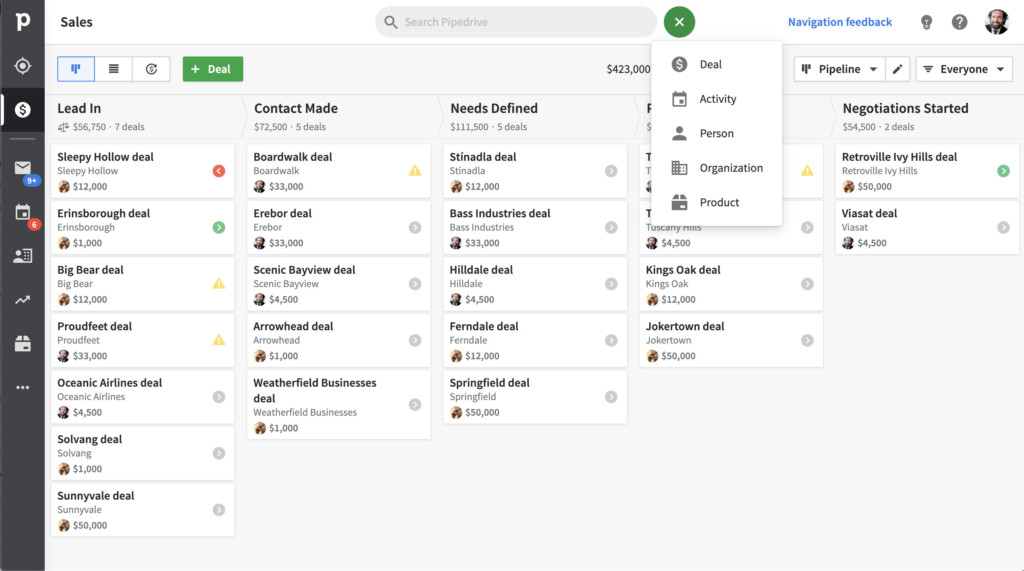
Best For: Mac users who want a powerful, sales-focused CRM that’s easier to use than Salesforce
Why I Chose It:
If you find Salesforce overwhelming or too expensive, Pipedrive is a breath of fresh air. It’s designed specifically for sales teams, helping you stay focused on closing deals. I found it easy to get started with, and it made visualizing my sales pipeline incredibly intuitive. For Mac users, it runs smoothly in any browser and integrates well with Apple tools via add-ons and third-party automation tools like Zapier.
Features:
- Visual sales pipeline to track deals and progress
- Built-in email sync and tracking (including templates and scheduling)
- Smart contact management with activity tracking
- Sales forecasting and performance reporting
- Web forms and chatbot tools for lead capture
- Workflow automation to streamline follow-ups
- Optional add-on for email marketing with segmentation tools
Integrations:
Pipedrive integrates with popular tools like:
- Google Workspace, Microsoft 365
- Apple Calendar via sync tools
- Zoom, Teams, Slack
- DocuSign, PandaDoc, Trello, Asana
- Mailchimp, Zapier, QuickBooks, Xero
Pricing:
- Starts at $14/month for the Essential plan. Add-ons like email marketing tools and document management software can increase the total cost.
- Free 14-day trial available.
You can read our full Pipedrive CRM review for a deeper look.
✅ Pros:
- Much easier to use than Salesforce
- Visual pipeline keeps sales efforts focused
- Includes email tracking and marketing tools
- Strong automation and analytics features
❌ Cons:
- No built-in project management features
- Add-ons can increase cost quickly with multiple users
- Best used in a browser – no dedicated Mac app
4. Clay (Best Personal CRM)
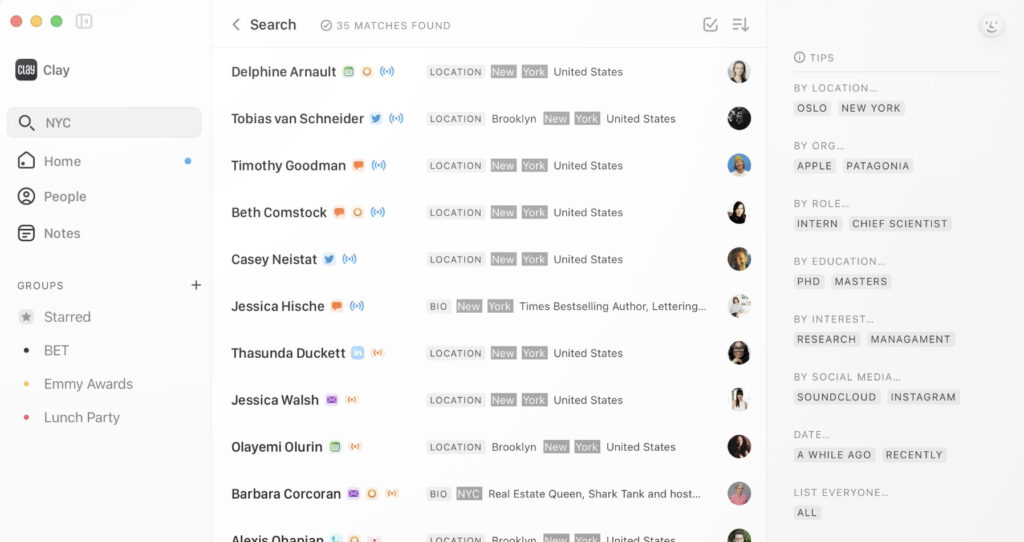
Best For: Mac users who want a personal CRM with a slick Mac desktop app
Why I Chose It:
I chose Clay CRM because it’s a beautifully designed personal relationship manager that helps you stay connected with the people who matter most. Clay offers a Mac desktop app but can also be used in Safari, Chrome, or Firefox. Built for individuals and small teams, Clay automatically organizes your contacts, surfaces context from past interactions, and provides gentle reminders to keep in touch, making it perfect for professionals who want a private, Mac-friendly personal CRM.
Integrations:
Clay integrates with a variety of services including those in macOS either natively or via API connections. These include:
- Apple Calendar and iCloud Contacts
- Google Contacts and Calendar
- Gmail and Outlook email accounts
- Twitter, LinkedIn, and iMessage (for contact syncing and activity tracking)
- Slack and Zoom for communication insights
- Zapier for extended integrations with thousands of apps
Features:
- Unified contact database with automatic updates from email and calendars
- Timeline view of past conversations, meetings, and shared notes
- Smart reminders to follow up with key contacts
- Powerful search to instantly find people, companies, or interactions
- Privacy-first design with end-to-end encryption and local backups
- Browser-based Mac access plus dedicated macOS and iOS apps for a native experience
- AI-powered summaries and insights about relationships and interactions
Pricing:
Clay offers simple, transparent pricing:
- Free Plan: Core features with limited integrations
- Pro Plan: $20/month or $200/year, adds full integrations, priority sync, and AI features
All plans include unlimited contacts and secure cloud syncing across devices.
A free trial is available on the Pro plan with no credit card required.
✅ Pros:
- Modern, elegant interface that feels native on macOS
- Automatic contact enrichment saves hours of manual entry
- Privacy-focused with strong encryption and user data controls
- macOS and iOS apps for seamless Apple ecosystem integration
- Affordable Pro plan compared to many business CRMs
❌ Cons:
- Lacks advanced sales pipeline or team collaboration tools
- Integrations are more focused on personal productivity than enterprise platforms
- Limited automation compared to larger CRMs
5. Bigin By Zoho (Best CRM For Small Sales Teams)
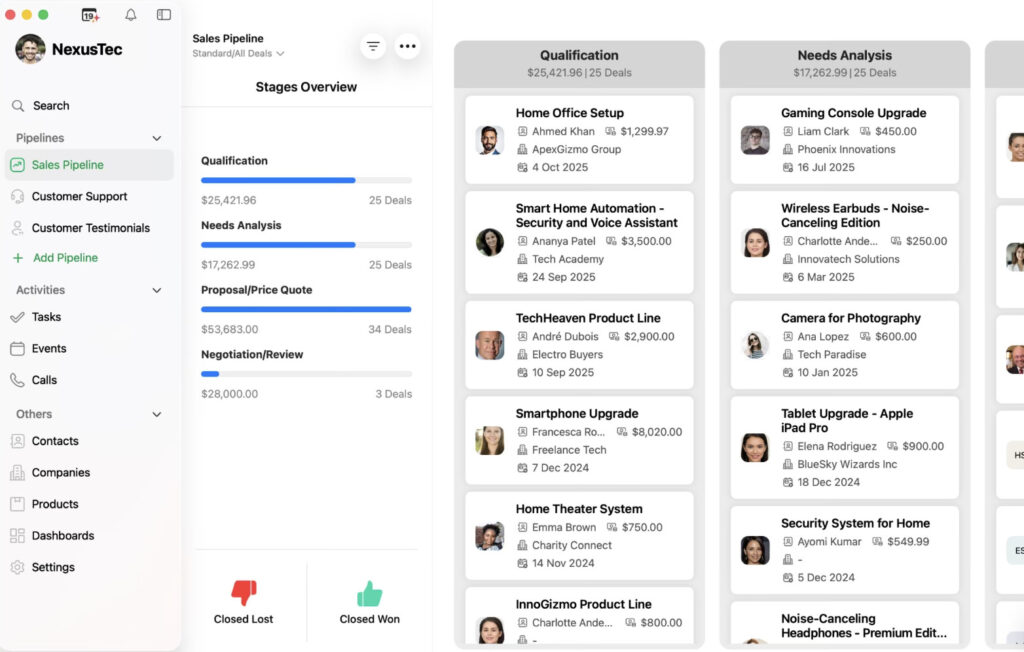
Best For: Small Mac based sales teams that need to get up and running quickly
Why I Chose It:
I chose Bigin CRM by Zoho because it strikes a smart balance between simplicity and power – ideal for Mac users who want a CRM for a small sales team that just works, without the bulk and complexity of full enterprise systems. Bigin offers a native macOS and iOS app but can also be used in any browser including Safari and Chrome. It’s very easy to learn and Zoho even claims you can get started with it in just 30 minutes.
Integrations:
Bigin connects with tools that many Mac users already use, either natively or via extensions:
- Google Workspace: Contacts, Calendar, Gmail sync and single sign-on
- Multichannel communication: email, built-in telephony, WhatsApp
- Zapier / API for custom connections
- Zoho ecosystem (CRM, Analytics) and its “Toppings” extensions
- Widgets, Mac Shortcuts, and interactive features in newer macOS versions
Features:
- Pipeline & deal management (team pipelines, sub-pipelines)
- Contact & company management with automatic enrichment and real-time updates
- Tasks, events, calls, and reminders integrated in the workflow
- Built-in telephony (making calls from inside the CRM)
- Workflow automation for routine processes (e.g. email triggers, status changes)
- Custom fields & modules, flexible layout customization
- Analytics: the Zoho Analytics connector gives you 75+ dashboards & reports
- Mac / iOS app features: real-time widgets, Live Activities, desktop widgets, app shortcuts, and smooth cross-device syncing
Pricing:
Bigin offers tiered pricing suited to small businesses:
- Free plan: Includes basic pipeline and contact features
- Paid plans: (starting at modest monthly rates) unlock full integrations, advanced automations, telephony, customizations, and analytics
You can start with a free trial (no credit card required) to test premium features.
✅ Pros:
- Lightweight, fast, and easy to pick up (minimal learning curve)
- Strong pipeline and task views make managing deals intuitive
- Built-in telephony is a rare plus in this tier of CRM
- Seamless Google Workspace integration for many Mac users
- Scalable via Zoho ecosystem and extensions
- Mac / iOS app enhancements (widgets, shortcuts) improve usability in the Apple ecosystem
❌ Cons:
- Lacks deeper enterprise features (complex sales territory, advanced reporting beyond what the Analytics connector adds)
- Less focused on marketing or multi-channel campaigns than full CRMs
- Free tier limitations may push users quickly to upgrade
- Automation and integration options, while solid, are not as extensive as high-end CRMs
6. Thryv (Best CRM For Sales Management)
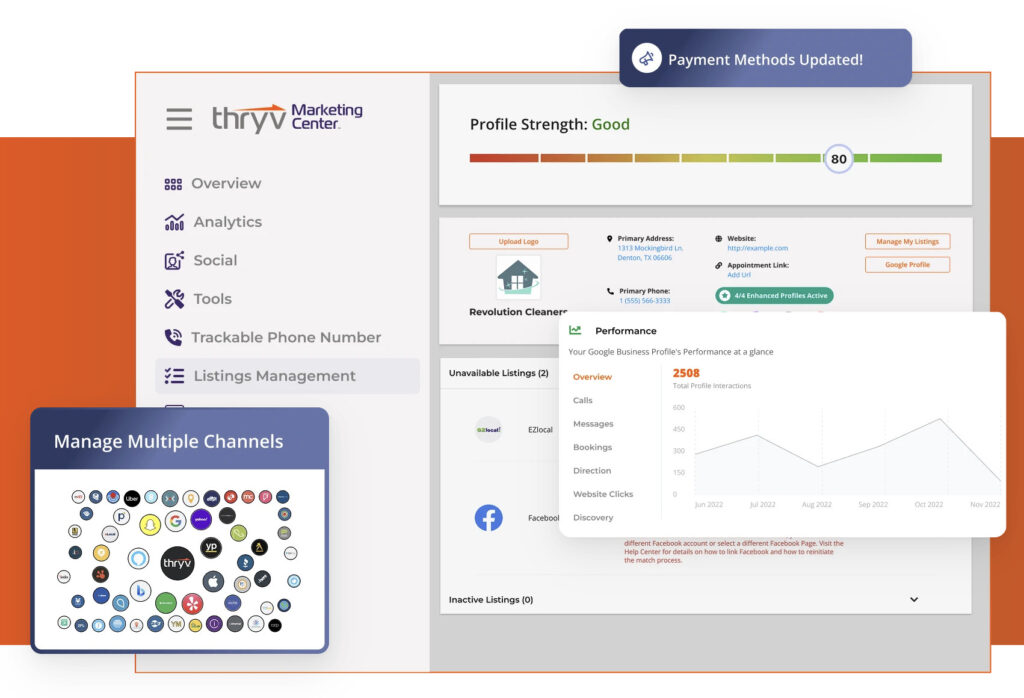
Best For: Mac users who want a professional sales management CRM with good macOS integration
Why I Chose It:
I chose Thryv CRM because it’s an all-in-one client experience and business management platform that’s designed to simplify operations for small businesses, and it works smoothly on a Mac. Since Thryv is entirely cloud-based, there’s no software to install and it runs effortlessly in Safari, Chrome, or Firefox. Thryv combines CRM, appointment scheduling, payments, marketing, and communication tools into one Mac-friendly dashboard, making it ideal for service-based businesses that want everything in one place.
Integrations:
Thryv integrates with a range of services commonly used by Mac users, either natively or through Zapier. These include:
- Apple Calendar (via calendar sync or third-party connectors)
- Google Calendar and Outlook
- QuickBooks Online and Square
- Zoom, Mailchimp, and Constant Contact
- Social media platforms (Facebook, Instagram, Twitter)
It also offers API access for custom integrations if needed.
Features:
- Built-in CRM for managing customer records, notes, and interactions
- Online appointment scheduling and calendar syncing
- Invoicing and payment processing tools
- Automated email and SMS marketing campaigns
- Reputation management and social media posting
- Custom client portals and branded communication tools
- Fully accessible via browser on macOS and includes a mobile app for iOS
Pricing:
Thryv isn’t cheap though and plans are as follows:
- Kickstart Plan: Starts from $646/month
- Ignite Plan: Starts from $881/month
- Accelerate Plan: $1,475/month
- A demo is available upon request, but there’s no free trial.
All plans include unlimited support, onboarding, and access to most core features.
Read our full Thryv Review to learn more.
✅ Pros:
- 100% cloud-based making it fully compatible with Macs
- Combines CRM, scheduling, payments, and marketing in one tool
- Simple and intuitive interface for small business owners
- Excellent support and onboarding included
- Mobile app for managing clients on the go
❌ Cons:
- Pricing is high for solo users or startups
- Limited third-party integrations compared to other platforms
- No free plan or trial without a sales demo
- More suitable for service businesses than product-based ones
7. Close (Best CRM For VoIP Integration)
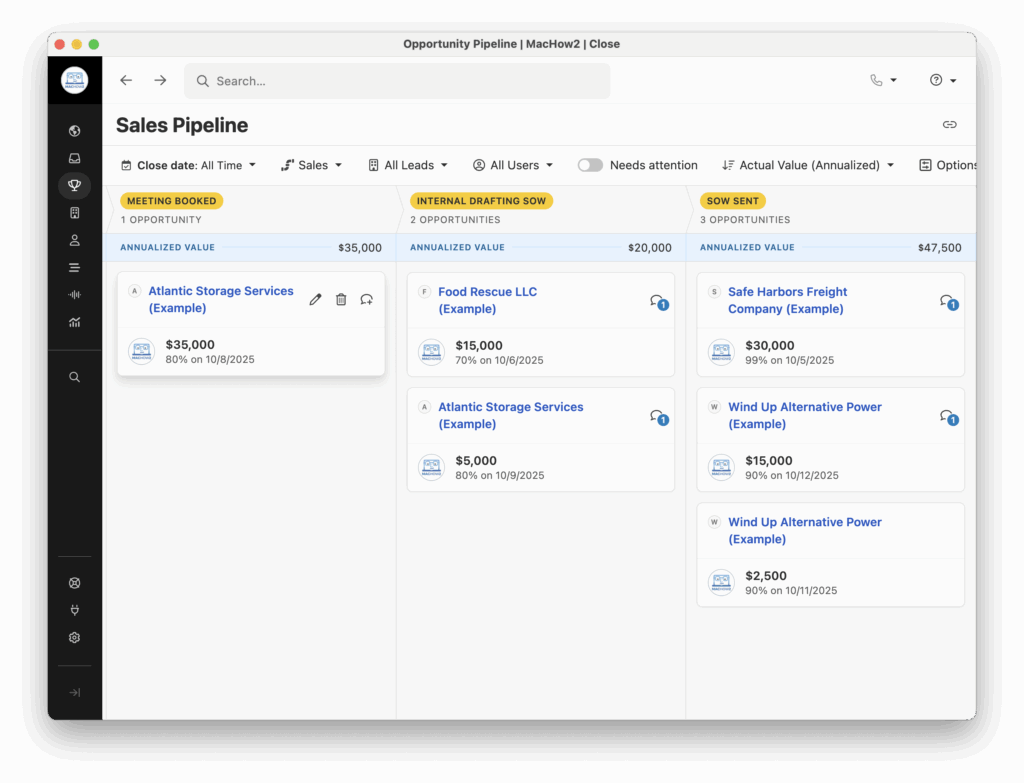
Best For: Small businesses and sales teams that rely heavily on calls, emails, and SMS for lead engagement
Why I Chose It:
Close CRM is designed for small businesses that want enterprise-grade features, but without the enterprise price. It combines sales, contact management, and communication tools (email, calling, SMS) into one easy-to-use platform. Unlike many CRMs, Close includes built-in VoIP calling, SMS messaging, and email tracking, with no need for extra add-ons.
Integrations:
Close integrates with popular tools like:
- Google Workspace, Microsoft 365
- Zoom, Slack
- Zapier, Make (Integromat), Tray.io
- HubSpot, Mailchimp, ActiveCampaign
- QuickBooks, Xero, Stripe
- Aircall, Twilio, WhatsApp (via integrations)
- Trello, Asana, Monday.com, Notion
Features:
- Built-in VoIP calling and SMS (no add-ons required)
- Call recording and voicemail tools
- Email marketing tools and performance tracking
- Lead importing and pipeline management
- Designed for scaling sales teams
- Browser-based with mobile support
Pricing:
- Starts at $9/month for solo plans
- 14-day free trial available
- Plans: Solo, Essential, Growth and Scale
- Close offers a 14-day free trial. SMS is limited to the US, UK, Canada, and Australia.
Read our Close CRM review for more.
✅ Pros:
- VoIP calling to 200+ countries
- Includes SMS and call recording
- Email marketing included
- Ideal for scaling businesses without enterprise pricing
❌ Cons:
- SMS is region-limited (US, UK, Canada, Australia only)
- No completely free plan
8. Contacts Journal CRM (Best One Time Purchase CRM)
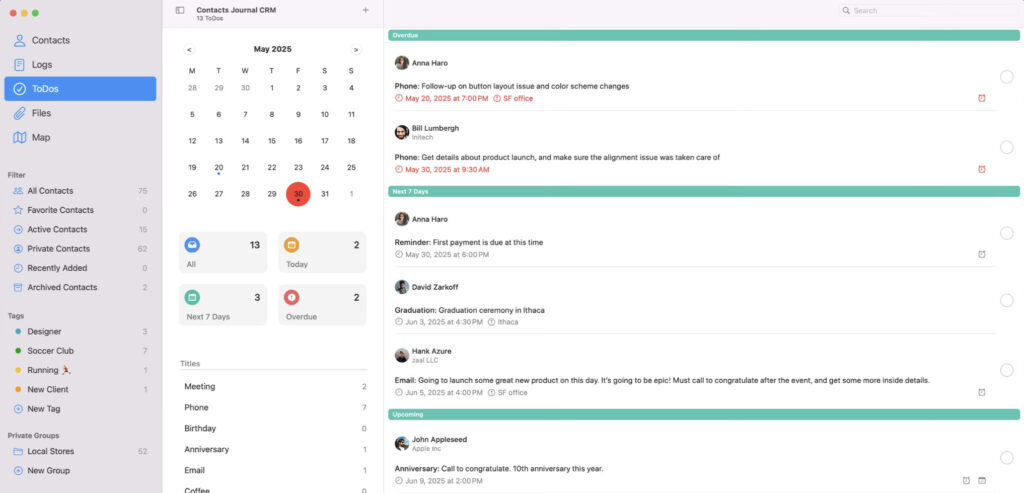
Best For: Mac users that need a contacts focused CRM and don’t want a subscription
Why I Chose It:
I chose Contacts Journal CRM because it’s designed from the ground up around managing relationships, meetings, and follow-ups rather than sales processes. It’s especially useful on a Mac thanks to its native macOS app, iOS app, and focus on personal use. There’s no heavy cloud dependency either – you retain control of your data while enjoying a slick, Mac-friendly interface. It’s also the only CRM I found that offers a one time-purchase option – no subscriptions required.
Integrations:
Contacts Journal CRM works well within the Apple ecosystem and integrates with commonly used tools:
- Apple Contacts – syncs with your native contact database
- Calendar / Reminders – attach meetings, tasks, and follow-ups
- Email – launch messages directly from contact entries
- iCloud / iCloud Drive – backup and sync data across your Apple devices
- Export / Import – supports CSV / vCard for moving data to or from other CRMs
- Shortcuts / Automation – supports Apple Shortcuts for automating actions on Mac / iOS
Features:
- Centralized contact journal with interaction history, meeting notes, and follow-up reminders
- Custom fields, tags, and categories to segment and classify relationships
- Smart reminders based on date, location, or custom rules
- Meeting logs with notes, photos, voice memos, documents – everything in one place
- Quick access to actions like calls, emails, messages, map directions from contact cards
- Native macOS app with windowed interface, iOS app, and continuity between devices
- Offline support and local control – your data stays on your device unless exported
Pricing:
- One-time purchase of $79.99 (no subscription needed) for full macOS & iOS access
- Optional in-app upgrades for advanced features or future enhancements
- Often a free trial version is available so you can test before full purchase
- A demo/trial version is available from the Mac App Store so you can test functionality first.
✅ Pros:
- Truly native Mac / iOS experience – fast, responsive, and well integrated
- Focused on relationships, meetings, and real human connections rather than sales metrics
- Offline-first architecture – no mandatory cloud lock-in
- Flexible customization with tags, fields, and reminders
- Excellent companion app on iPhone / iPad so you can take notes on the go
❌ Cons:
- Not built for full sales pipelines or team collaboration
- Lacks sophisticated marketing tools, email automation, or outreach sequencing
- Integration breadth is more limited compared to cloud-based CRMs
- No built-in web client – must use Mac or iOS app for access
9. Salesforce (Best CRM For Enterprises)
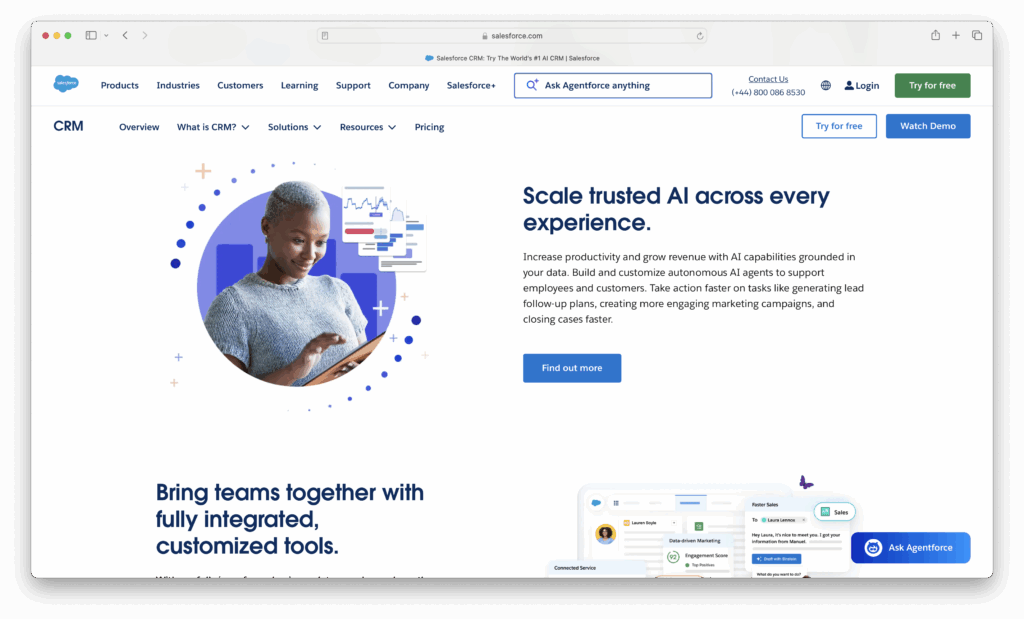
Best For: Large businesses and enterprises that need a highly customizable, scalable CRM with advanced automation and analytics
Why I Chose It:
Salesforce is the most widely used CRM in the world and sets the benchmark for enterprise-level customer relationship management. It’s ideal for large organizations that need a flexible platform capable of handling complex sales, marketing, customer service, and analytics workflows. Salesforce offers unmatched customization options through its AppExchange marketplace, allowing you to tailor every aspect of your CRM, from user dashboards and automation rules to third-party integrations and industry-specific tools.
Features:
- Lead and opportunity management with extensive customization
- Salesforce Einstein AI for insights, automation, and predictions
- Powerful workflow builder and approval processes
- Massive AppExchange marketplace for add-ons and industry solutions
- Browser-based with iOS mobile apps
- Reporting, dashboards, and revenue forecasting tools
Pricing:
- Essentials: $25/user/month
- Professional: $80/user/month
- Enterprise: $165/user/month
- Unlimited: $330/user/month
- Free trial available
✅ Pros:
- Extremely customizable with third-party and native tools
- Enterprise-grade analytics and automation
- Industry-specific solutions (e.g. finance, healthcare, manufacturing)
- Robust AI tools via Salesforce Einstein
- Vast ecosystem of integrations
❌ Cons:
- Expensive as features scale
- Steep learning curve for beginners
- No native desktop app for Mac (browser-based only)
10. Folk CRM (Best Simple macOS/iOS CRM)
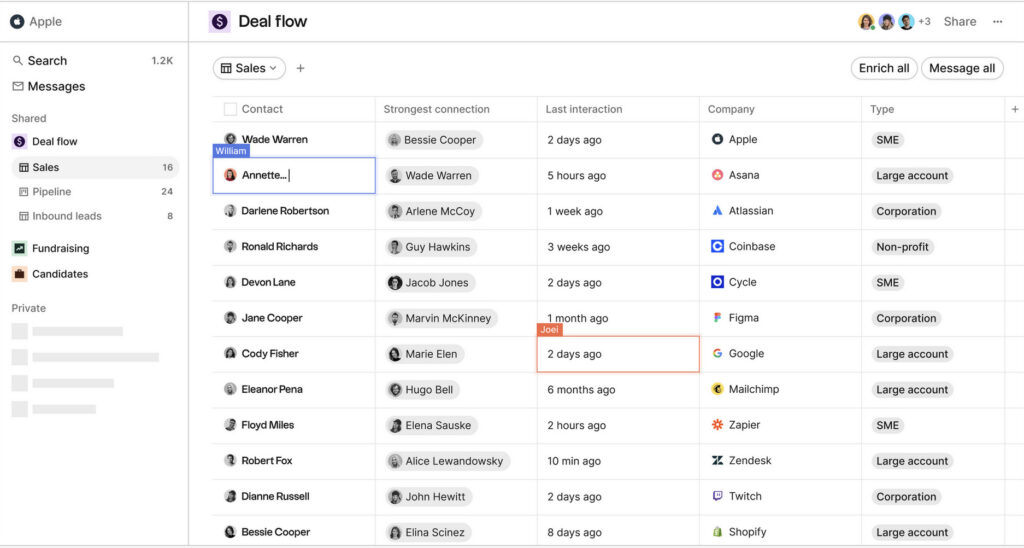
Best For: Those that want a simple and straightforward Apple focused CRM for macOS and iOS
Why I Chose It:
I chose Folk CRM because it offers a clean, modern, and lightweight CRM experience that’s perfect for Mac users who want a contact-first approach without the complexity of enterprise tools. Designed with a strong emphasis on user experience and visual clarity, Folk works beautifully in macOS browsers like Safari and Chrome, making it ideal for freelancers, startups, and small teams using Apple hardware.
Integrations:
Folk integrates with key Mac-compatible and cloud tools, including:
- Google Contacts and Gmail
- Apple Calendar (via third-party connectors like Zapier or Make)
- Slack
- Notion, Airtable, and LinkedIn (via browser extensions and syncs)
- Zapier and Make.com for extended Mac ecosystem workflows (e.g., syncing with Apple Reminders or Mail)
Its browser extension also lets you pull contact info directly from Gmail or LinkedIn, a handy feature for Safari and Chrome users on macOS.
Features:
- Visual, contact-centric CRM built for relationship management
- Tag-based system to organize contacts by context (clients, PR, investors, etc.)
- Smart reminders and follow-up tracking
- Gmail integration for logging and sending messages directly
- Collaborative features for sharing contact lists with teams
- Works entirely in most browsers on macOS
- iOS mobile app available for managing contacts on the go
Pricing:
Folk offers a flexible pricing structure:
- Free Plan: Up to 100 contacts, basic features included
- Standard Plan: $24/user/month – includes unlimited contacts, integrations, and reminders
- Premium Plan: Custom pricing – for advanced collaboration and team controls
- A 14-day free trial is available on all paid plans.
✅ Pros:
- Beautiful, lightweight UI works seamlessly on Mac
- Focuses on relationships rather than traditional sales pipelines
- Easy to use with minimal setup required
- Works well for freelancers, PR teams, and agencies
- Quick Gmail and LinkedIn syncing via browser
❌ Cons:
- Not a full-featured sales CRM, lacks pipeline and forecasting tools
- Limited native Apple Calendar and Mail integration (requires workarounds)
- May not scale well for complex workflows or large sales teams
- Fewer automation features compared to larger CRMs
11. Clarify (Best AI CRM)
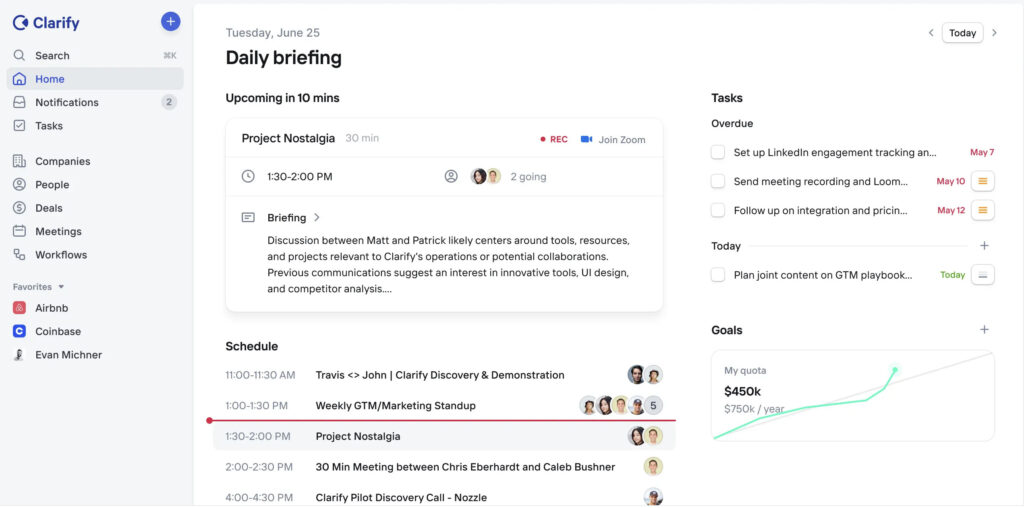
Best For: Founders and revenue teams looking for an AI-native CRM that automates data capture, meeting prep, and follow‑ups
Why I Chose It:
Clarify CRM is a modern, AI-first solution designed for small to mid-size revenue teams who want a CRM that doesn’t just store data but actively enriches and updates itself with no manual entry required. Built with founders, operators, and RevOps teams in mind, it integrates with your email, calendar, and LinkedIn to automatically build pipelines, prep meetings, and summarize deal progress. This “autonomous CRM” takes over repetitive tasks, from extracting contacts to drafting follow-up emails, so you can focus on closing deals instead of clicking through outdated software.
Features:
- Automatically captures contacts and updates records from your inbox and calendar
- AI suggests deals, drafts summaries, and forecasts pipeline activity
- Context-aware insights and AI-generated email drafts ensure you never miss follow-ups
- Dynamic views with semantic search to explore your data intelligently
- Open APIs, custom objects, and flexible workflows for scaling operations
Pricing:
- Plans start at $20/m
- Free plan available for up to 2.5k credits/month.
✅ Pros:
- Automates admin work
- Clean, fast modern UI, praised by users for its performance
- Built-in AI features work well, automatic enrichment, follow-ups, deal scoring
- Highly flexible schema and powerful dev-friendly features
❌ Cons:
- Early-stage product with some missing features and limited integrations beyond core systems
- Currently invite-only, no public free plan; early access required
- Documentation and APIs are still being fleshed out
Why Trust Our Reviews
We’ve been reviewing Mac software since 2013 and have been testing CRMs exclusively on macOS throughout this time.
We research and test all of the products we cover and have used thousands of different Mac apps over the years. For more check out our testing methodology and selection process.
Related Software
If you found this helpful or didn’t find what you were looking for here, you may also find the following articles useful:
- Project Management Software For Mac
- HR Management Software For Mac
- Email Marketing Software For Mac
- Scheduling Software For Mac
- Time Tracking Software For Mac
How We Chose These Mac Compatible CRMs
The most important thing we looked for in these CRM solutions were integration with Apple’s built-in productivity tools in macOS such as Contacts and Mail.
Naturally, we also gave preference to CRMs with Mac desktop apps which as we found, are few and far between nowadays.
However, the fact is that the majority of CRM tools on the market now are SaaS Cloud based solutions although there are some that have desktop apps. .
There is also a downside to using a Mac only CRM app which is that you may have incompatibility problems when new versions of macOS are released.
If the developer isn’t quick to update the app for new releases of macOS, then you may find yourself unable to use your CRM.
This isn’t a problem with cloud based solutions however which are updated continually and are not affected by updates to macOS.
Other things we evaluated these CRM tools on were:
- Price
- Ease of use
- Contact and sales pipeline management integration
- Reporting tools
- Third party integrations
- Email marketing tools
Depending on whether your business is active on social media, you may also want to consider whether the CRM can monitor your social media channels.
Some CRM tools allow you to monitor customer reaction to products or services on social media such as Twitter, Facebook and LinkedIn.
Why Use a CRM On a Mac?
The biggest advantage of any CRM is that it centralizes information and automates tasks and analyzes data to make your business more efficient.
Typical functions of a CRM include:
- Managing contacts
- Managing your sales pipeline
- Customer support
- Document management to go paperless
- Creating landing pages
- Manage databases of client data
- Email marketing tools
- Managing meetings although we’d recommend using scheduling software for this
- Invoicing and billing although we’d recommend using invoicing software for this
Some of the most significant advantages of using a CRM system are:
- Improves how team collaborate. If you don’t already use project management software, CRM tools can be used for things like assigning tasks, logging work and tracking time.
- Manage clients more efficiently. A CRM solution makes it much easier to handle customer enquiries, follow-up leads and manage social media interactions across multiple channels. You’ll also have a much better history of customer interactions to use when dealing with long term clients.
- Automate tasks. The best CRM software can automate your customer management tasks such as on-boarding, follow up emails, SMS messages and contact reminders.
- Generate reports. Reports allow you to take stock of how your business is doing periodically so that you can strategize and identify where improvements can be made.
What’s New in 2025 For CRM Software?
In 2025, CRM software has evolved significantly, with a growing focus on native macOS integration, AI-driven automation, and streamlined, all-in-one platforms tailored to small and midsize business users.
Deeper Apple Device Integration
- Many CRMs now sync directly with Apple Calendar, Apple Mail, and Messages, using native protocols like iCal, IMAP/SMTP, and push notifications via macOS’s Notification Center.
- Some tools, like Daylite CRM, are true macOS-native apps for faster performance and Spotlight search integration.
AI-Powered Assistance
- CRM platforms are increasingly embedding AI assistants that auto-summarize client interactions, recommend follow-ups, or even draft email responses.
- Newer tools like Folk are using AI to auto-organize contacts and pipeline stages without user input, ideal for time-strapped teams on MacBooks or iPads.
Unified Mobile & Desktop Experiences
- Cloud CRMs in 2025 prioritize cross-device syncing so that workflows begun on macOS can be seamlessly continued on iPhone or iPad.
- Enhanced PWA (Progressive Web App) support means many Mac users now run full-featured CRMs right from Safari without installing a desktop app.
Better Integrations with Mac-Friendly Tools
- CRM platforms now offer native integrations with popular Mac tools like:
- Slack, Notion, and Trello
- iCloud Contacts & Calendars (via third-party sync tools)
- Final Cut Pro (for agencies using CRMs to track media client projects)
Lightweight, Human-Centered CRMs
- In contrast to bulky enterprise systems, lightweight CRMs like Clay, Folk and Bigin by Zoho are trending for being simple, fast, and optimized for Apple users who just want to track contacts, follow-ups, and tasks without unnecessary complexity.


